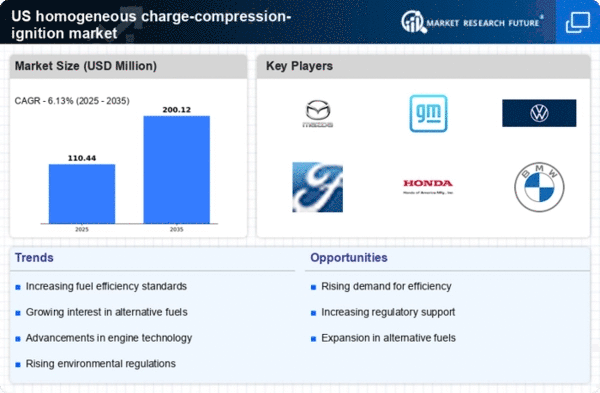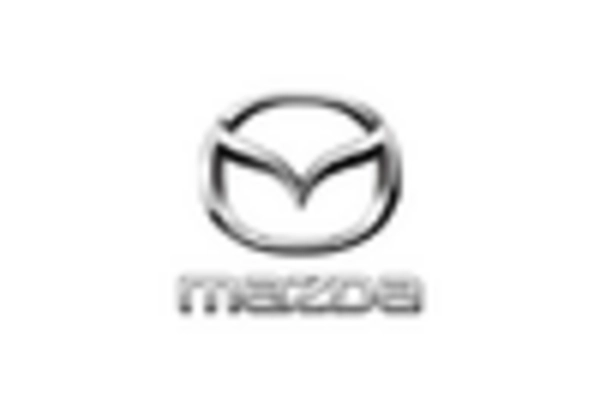Increased Investment in R&D
Investment in research and development (R&D) is a critical driver for the homogeneous charge-compression-ignition market. As competition intensifies among automotive manufacturers, there is a growing emphasis on developing innovative engine technologies that enhance performance and reduce emissions. Companies are allocating substantial budgets, often exceeding millions of dollars, to explore the potential of homogeneous charge-compression-ignition systems. This investment is likely to yield advancements in engine efficiency, durability, and overall performance. Moreover, partnerships between automotive firms and research institutions are becoming more common, facilitating knowledge exchange and accelerating technological breakthroughs. The focus on R&D not only fosters innovation but also positions the homogeneous charge-compression-ignition market as a leader in sustainable automotive solutions, appealing to environmentally conscious consumers.
Rising Fuel Efficiency Standards
The homogeneous charge-compression-ignition market is experiencing a notable push due to the increasing fuel efficiency standards mandated by regulatory bodies in the US. These standards aim to reduce greenhouse gas emissions and enhance fuel economy across various vehicle types. As a result, manufacturers are compelled to innovate and adopt advanced engine technologies that align with these regulations. The implementation of homogeneous charge-compression-ignition technology is seen as a viable solution, potentially improving fuel efficiency by up to 30% compared to traditional combustion engines. This shift not only addresses environmental concerns but also meets consumer expectations for more economical vehicles, thereby driving growth in the homogeneous charge-compression-ignition market. Furthermore, the market is projected to expand as automakers invest in research and development to comply with these stringent standards.
Consumer Awareness of Environmental Impact
Consumer awareness regarding the environmental impact of vehicles is significantly influencing the homogeneous charge-compression-ignition market. As individuals become more informed about the effects of traditional combustion engines on air quality and climate change, there is a growing demand for cleaner alternatives. This shift in consumer sentiment is prompting manufacturers to prioritize the development of engines that utilize homogeneous charge-compression-ignition technology, which is known for its lower emissions and improved fuel efficiency. Market data indicates that approximately 70% of consumers are willing to pay a premium for vehicles that demonstrate reduced environmental footprints. Consequently, this heightened awareness is driving manufacturers to innovate and invest in technologies that align with consumer preferences, thereby propelling the growth of the homogeneous charge-compression-ignition market.
Government Incentives for Clean Technology
Government incentives aimed at promoting clean technology are playing a pivotal role in the expansion of the homogeneous charge-compression-ignition market. Various federal and state programs offer financial incentives, such as tax credits and rebates, to consumers who purchase vehicles equipped with advanced engine technologies. These initiatives not only encourage consumers to opt for cleaner vehicles but also motivate manufacturers to invest in the development of homogeneous charge-compression-ignition systems. The financial support provided by the government can significantly reduce the overall cost of ownership for consumers, making these vehicles more attractive. As a result, the homogeneous charge-compression-ignition market is likely to witness increased adoption rates, driven by both consumer incentives and the commitment of manufacturers to meet evolving regulatory requirements.
Technological Integration with Hybrid Systems
The integration of homogeneous charge-compression-ignition technology with hybrid systems is emerging as a key driver in the market. As the automotive industry shifts towards electrification, the combination of traditional combustion engines with electric powertrains presents a unique opportunity for enhancing vehicle performance and efficiency. This hybridization allows for the benefits of homogeneous charge-compression-ignition, such as improved fuel efficiency and reduced emissions, to be realized alongside the advantages of electric propulsion. Market analysts suggest that this synergy could lead to a more sustainable automotive future, appealing to a broader range of consumers. The potential for hybrid systems to achieve fuel economy improvements of up to 50% further underscores the importance of this trend in the homogeneous charge-compression-ignition market.
















